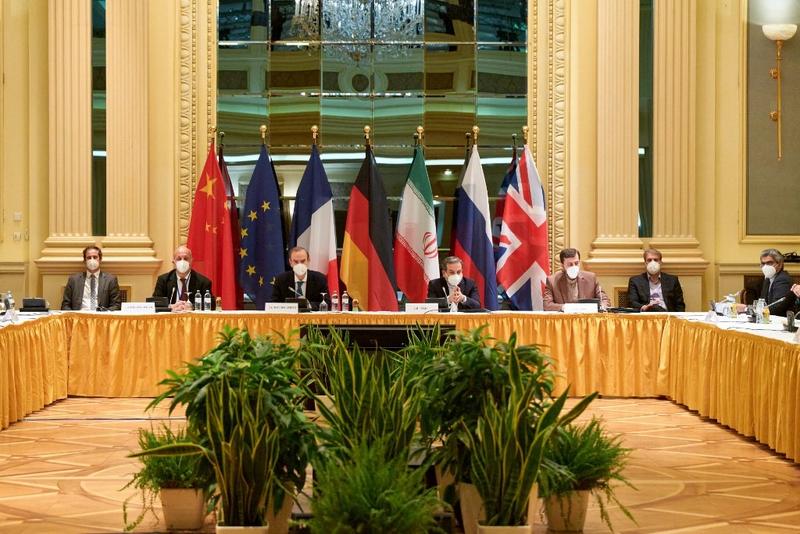 This handout photo taken and released on April 17, 2021 by the EU Delegation in Vienna shows delegation members from the parties to the Iran nuclear deal - Germany, France, Britain, China, Russia and Iran – attending a meeting at the Grand Hotel of Vienna as they try to restore the deal. (HANDOUT / EU DELEGATION IN VIENNA / AFP)
This handout photo taken and released on April 17, 2021 by the EU Delegation in Vienna shows delegation members from the parties to the Iran nuclear deal - Germany, France, Britain, China, Russia and Iran – attending a meeting at the Grand Hotel of Vienna as they try to restore the deal. (HANDOUT / EU DELEGATION IN VIENNA / AFP)
World powers made progress in their efforts to end a years-long standoff between Iran and the US over the fate of the 2015 nuclear deal, as the Islamic Republic said a “new understanding” was taking shape at key talks in Vienna.
Iran’s lead negotiator, Deputy Foreign Minister Abbas Araghchi, said serious disagreements remain but that his country was working on a draft text for reviving the accord that could work as a framework for subsequent discussions.
Iran’s lead negotiator, Deputy Foreign Minister Abbas Araghchi, said serious disagreements remain but that his country was working on a draft text for reviving the accord that could work as a framework for subsequent discussions
“The drafting of the text can begin now, and the Iranian delegation has prepared and presented its text on the nuclear sphere and the lifting of sanctions,” Araghchi told Iranian state TV. The US hasn’t commented on Iran’s upbeat characterization.
Earlier this week Araghchi said that Washington and Tehran had to specify the steps they would each need to take in order to restore the 2015 deal, including a tally of all Trump-era sanctions that Iran says the US would need to remove.
Araghchi’s comments inject new hope into a process that was plunged into crisis last week after an attack on a major Iranian nuclear facility in Natanz, triggered the Islamic Republic into enriching uranium at levels nearer to weapons grade. Iran blames the incident on Israel. The International Atomic Energy Agency confirmed on Saturday that Iran has started the process of enriching uranium to 60 percent and had already enriched the metal to 55 percent.
Iran insists that the uranium will be used for medical purposes only.
ALSO READ: Iran says began 60% uranium enrichment after Natanz incident
“The reality is that the alternative to reviving the nuclear deal is not attractive for either side,” said Ali Vaez, director of the Iran Project at the International Crisis Group. “But a lot of hard work remains, including on figuring out how to sequence the implementation of the measures and their verification.”
Abandonment of the landmark deal in 2018 by the US, and reimposition of economic sanctions by then-President Donald Trump, pushed relations between the longstanding foes toward a breaking point. It’s also convulsed the Persian Gulf with assassinations, attacks on energy installations, and tanker seizures in a major global choke-point for oil supplies.
In 2019 Iran responded to Trump’s so-called “maximum pressure” strategy by gradually increasing its atomic activity, beyond the limits allowed in the nuclear deal.
President Joe Biden has pledged to return the US to the accord, but his administration has been reluctant to make any grand gestures or agree to remove sanctions all at once, something Iran insists Washington must do as the party that first violated the deal.
While the US is yet to comment on the latest talks, which will resume on Sunday, the European Union and Russia, which along with China are trying help the two countries choreograph the restoration of the deal and full compliance to its terms, echoed Araghchi’s cautious optimism.
READ MORE: Iran blames Israel for Natanz outage, vows revenge
It was “key” that all the parties are committed to seeing the US rejoin the accord and that it’s fully implemented by both Washington and Tehran, said Mora.
Russia’s envoy to the International Atomic Energy Agency, Mikhail Ulyanov, said that the countries would continue working over the weekend and into next week as they agreed to “not waste time” and reach a successful outcome “as soon as possible”.


